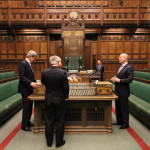The best of Democratic Audit’s 2014 coverage of Parliamentary reform
The UK’s archaic Parliamentary system remains in dire need of reform and renewal. Recent events resulting from the Scottish independence referendum – particularly the Prime Minister’s plans to exclude Scottish MPs from voting in English domestic legislation – threaten to elevate our constitutional incoherence to hitherto unprecedented levels. The Democratic Audit blog has kept a close eye on the best analysis of Parliament in 2014.
John Bercow, the Speaker of the House of Commons, recently suggested that the old-fashioned language in use in Parliament may further reinforce the public’s sense of distance with democracy. Assessing his claims, Andrew Scott Crines argues that language is a problem, but that it would be a mistake to stop there, with the physical shape of the House of Commons, and the voting system in particular acting as a barrier to public engagement.
All parties should ignore calls for the Fixed Term Parliaments Act to be repealed
Labour recently announced its plan to keep the Fixed Term Parliament Act, which prevents an early election being called, should it win power at next May’s General Election. Petra Schleiter argues that those who are critical of the Act miss the key point that its adoption forced Prime Ministers to govern in a more inclusive way, and makes it impossible for them to heed the siren calls of calling an advantageously timed election.
Five minutes with Graham Allen: “Unlike most democracies, the UK lacks a document that sets out the rules of the political game”
The Political and Constitutional Reform Committee, chaired by Graham Allen MP, has launched a project which aims to consult with the public about whether the UK needs a written constitution, and what such a document should contains. He argues that the country would be better governed if we took the chance to give ourselves what most democracies take for granted: an easily accessible document which states in unequivocal terms what the terms of the political game are.
A small British Senate is the best alternative to the bloated and undemocratic House of Lords
House of Lords reform was scuppered in 2011 when the Conservatives opted not to back the Liberal Democrats’ plan in sufficient numbers. With David Cameron recently opting to appoint a new tranche of Lords and bringing the total size of the chamber to the highest level since 1999, talk of reform has returned. Stephen Barber argues that despite some welcome steps in modernising the Lords, democracy is the only real form of legitimacy, and that a small British Senate offers the best alternative to the current arrangements.
The pressure is growing for Commons bill committee reform
In June 2013 the Constitution Unit published Fitting the Bill: Bringing Commons Legislation Committees into Line with Best Practice, proposing a series of changes to Commons bill committees. Last week the issue was brought back into the headlines, as John Bercow emphasised the need for reform, says Meg Russell.
The election of Sarah Wollaston as Chair of the health committee illustrates the changing nature of the committee system
The Commons select committee system has just received a further injection of new blood in the person of former GP and Conservative back-bencher Dr Sarah Wollaston MP. The Institute for Government’s Hannah White asks what her election as the new Chair of the health select committee tells us about the way the system is changing.
Prime Minister’s Question time is often seen as representing the worst of British politics, with MPs regularly accused of acting like baying children in an attempt to intimidate their rival’s leader. But while this spectacle may be unedifying, Rob Salmond‘s research shows that PMQs and similar legislative sessions across the world increase engagement with politics because of their accessibility and excitement.
Essential scrutiny or a national embarrassment? Experts respond to the Hansard Society’s report on Prime Minister’s Questions
The Hansard Society recently published research which showed the public’s disapproval of the shouting and braying that takes place at the weekly Prime Minister’s Question time. But is this merely a sign of a healthy democracy? We asked a number of experts on Parliament and democracy to respond to the research, and give their views as to whether this ritual is worth the trouble.
—
Note: this post represents the views of the author and not those of Democratic Audit or the LSE. For individual image credits please click through to the articles. Please read our comments policy before posting.








 Democratic Audit's core funding is provided by the Joseph Rowntree Charitable Trust. Additional funding is provided by the London School of Economics.
Democratic Audit's core funding is provided by the Joseph Rowntree Charitable Trust. Additional funding is provided by the London School of Economics.
The best of Democratic Audit’s 2014 coverage of Parliamentary reform https://t.co/6EtC1yw6sX
The best of Democratic Audit’s 2014 coverage of Parliamentary reform https://t.co/qClOh1RtjW